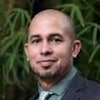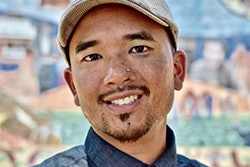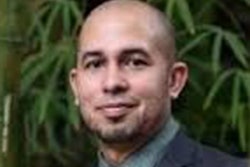Dr. David H. Olwell, professor and dean of the Hal and Inge Marcus School of Engineering at Saint Martin’s University, sees assistant professor of civil engineering Dr. Floraliza Bornasal as “simply outstanding.”
Bornasal, an alumna of the engineering school, lives her life by the Benedictine values that permeate the campus, says Olwell.
“She’s helping students understand what it means to place work in an overall context for what they’re trying to do with their lives,” Olwell says. “She’s very helpful in showing that technical competence is important, but framing that in terms of service to the community is why you want to be a civil engineer.”
Bornasal joined the faculty at Saint Martin’s in 2015. While she had a positive undergraduate experience, she also envisioned ways that she could contribute to the university. As she was finishing her doctoral studies, she knew she wanted to enter academia and her alma mater seemed a natural fit.
Her interest in civil engineering began as a high school senior when she wrote a research paper on waste water engineering in the developing world. Her strengths in math and science matched well with the field. During college, her focus became transportation engineering.
Bornasal’s family emigrated from the Philippines when she was seven and grew up in eastern Washington State, where the Asian population was very small. She is a first-generation college student and easily relates with first-gen struggles, which is why she says that it’s essential for her to be accessible to her students.
Her college and graduate studies were financed by a Gates Millennium Scholarship, and, in between college and graduate school, she did a year-long stint with AmeriCorps VISTA, a national service program designed to alleviate poverty.
As a professor, she emphasizes to her students that, if there’s content that is complex and hard to understand in her courses, she wants her students to have a sense of agency to speak up.
At a time when there are many discussions about the infrastructure of America’s roads, bridges and transportation system, Bornasal prepares students to understand their responsibilities and role in making decisions about design, construction and maintenance.
“If we’re having a discussion about how to align a roadway, the conversation shouldn’t be purely on the mathematics portion of it, but also considering what resources will it take not just to construct this, but also over time maintain it,” she explains. “That type of conversation is important for students so they’re really conscious that what we build is going to have a certain lifespan, and you need to be considerate of that when we’re talking about infrastructure and effective, efficient roads.”
While teaching a full course load, Bornasal is also working toward earning her professional engineering license. Her work with local companies and governments gives her hands-on experiences that she can share in the classroom, providing a link between practice and education. She is also working as a traffic engineer for a local engineering firm, and she’s incorporating the firm’s project on permeable pavement into her research repertoire.
Her current research involves working with her mentor, Dr. Shane Brown of Oregon State University, on a follow-up to the study she completed for her doctoral degree. The study looks at an ethnography of engineering, how concepts touched on in undergraduate engineering education manifest in practice. Moving forward, Bornasal wants to research aspects of engineering education, such as curriculum development.
In May 2017, Bornasal was selected as the outstanding faculty member on campus for her excellence in teaching, research and service. She is currently the adviser for the Society of Women Engineers and the Filipino Heritage Club and serves as a mentor for the university’s Boys & Girls Club science exploration series.
“She’s committed to student success,”
says Olwell, who notes that female
enrollment has increased in part because of
Bornasal’s mentorship. “She’s doing good
scholarship in transportation engineering,
but I think her biggest influence is
going to be contributing to turning out
civil engineers who will practice civil
engineering informed by Benedictine
values.”
Title: Assistant Professor, Civil Engineering, Saint Martin’s University
Tenured: No
Education: Ph.D., civil engineering, Oregon State University, 2015; M.S., civil engineering, Oregon State University, 2012; B.S., civil engineering, Saint Martin’s University, 2009
Age: 31
Career mentors: Dr. Shane Brown, Oregon State; Dr. Olivia Archibald, Saint Martin’s University; Dr. Pius Igharo, Saint Martin’s University
Words to live by: “You shouldn’t overload yourself to a point where it gets too stressful as you’re trying to pursue teaching, research and service.”















